Tales and Jokers
Hospitality runs deep in these desert people. For example, the nomadic custom is to give gifts when you leave your host, rather than when you arrive as we might. It is much more important that you have their prayers for your safe continuing journey through the dangers of the desert and the uncertainties of future life than what might be construed as a ‘down payment’ on their hospitality.
 We express our gratitude with gifts of green tea and sugar and in return receive blessings, goat’s milk and a full skin of well water. Salaam Alaikum: peace be with you. Mohamedune’s family return to their herding and we depart without looking back. He will be away for another week or two. Backward glances or waving would be very rude - the host might feel that all that should have be said was not said, or that we had not been sent on our way properly.
We express our gratitude with gifts of green tea and sugar and in return receive blessings, goat’s milk and a full skin of well water. Salaam Alaikum: peace be with you. Mohamedune’s family return to their herding and we depart without looking back. He will be away for another week or two. Backward glances or waving would be very rude - the host might feel that all that should have be said was not said, or that we had not been sent on our way properly.A gentle day’s journey towards the distant pink mountain with a long stop for lunch in the heat passes easily. Young Mohamed is now accepted by the other three who were old friends and demonstrates his fearless bareback riding skills.
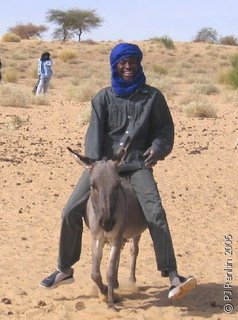 Al Hadana, the cameleer is our joker, whether noisily imitating Tamasheq ‘rap’, showing off by balancing on one foot on his camel or holding forth around the campfire at night.
Al Hadana, the cameleer is our joker, whether noisily imitating Tamasheq ‘rap’, showing off by balancing on one foot on his camel or holding forth around the campfire at night.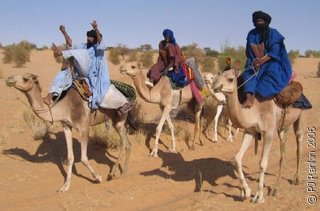 Stories run deep in this culture. It’s the way to teach about life in the desert, history, Islam, morals or nomadic customs. Sometimes storytelling is the way to cool meetings between clans in conflict. Sometimes it’s just for pure entertainment on long desert journeys or for whispering in soft Tamasheq around the fire long into the night. Old and young love their stories. There's an old Sudanese proverb: 'Salt comes from the North, gold from the South, money from the land of the white man, but the word of God, holy things and beautiful tales one finds them only in Timbuktu'.
Stories run deep in this culture. It’s the way to teach about life in the desert, history, Islam, morals or nomadic customs. Sometimes storytelling is the way to cool meetings between clans in conflict. Sometimes it’s just for pure entertainment on long desert journeys or for whispering in soft Tamasheq around the fire long into the night. Old and young love their stories. There's an old Sudanese proverb: 'Salt comes from the North, gold from the South, money from the land of the white man, but the word of God, holy things and beautiful tales one finds them only in Timbuktu'.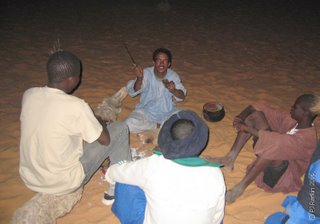 What a surprise to find out that the stories being told around the fire with such delight are just like the old '1001 Arabian Nights' tales! Stories of magic calabashes, serpents, sons with magic powers and princesses falling in love with slaves! The tales are handed down as Tuareg family heirlooms in precious manuscripts written in arabic. In the 14th century, when Timbuktu was the centre of learning of the African Islamic world, all the scholars and teachers came to study and write in Timbuktu. There are still 25000 rare manuscripts in the libraries of Timbuktu, full of legends, poetry, Koranic teaching, early astronomy, medicine and mathematics. Perhaps some of the 1001 Arabian Nights tales were actually written here, then taken back to Persia!
What a surprise to find out that the stories being told around the fire with such delight are just like the old '1001 Arabian Nights' tales! Stories of magic calabashes, serpents, sons with magic powers and princesses falling in love with slaves! The tales are handed down as Tuareg family heirlooms in precious manuscripts written in arabic. In the 14th century, when Timbuktu was the centre of learning of the African Islamic world, all the scholars and teachers came to study and write in Timbuktu. There are still 25000 rare manuscripts in the libraries of Timbuktu, full of legends, poetry, Koranic teaching, early astronomy, medicine and mathematics. Perhaps some of the 1001 Arabian Nights tales were actually written here, then taken back to Persia!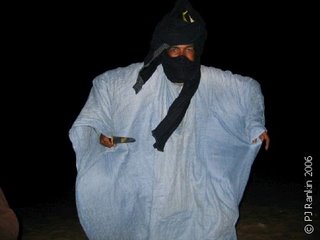 Al Hadana tells stories with great energy, kicking showers of coals over Omar or waving his knife to emphasize a point, to the delight of the audience gathered around the fire.
Al Hadana tells stories with great energy, kicking showers of coals over Omar or waving his knife to emphasize a point, to the delight of the audience gathered around the fire.
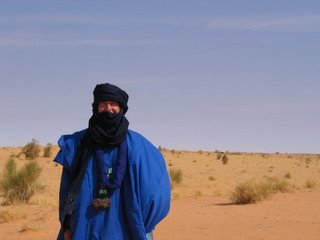


0 Comments:
Post a Comment
<< Home